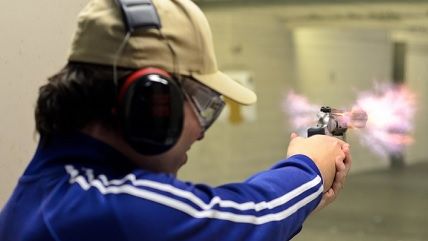Should Felons Get Their Gun Rights Back?
Yes, especially if their right to vote's been restored.

Democratic Virginia Gov. Terry McAuliffe's order restoring the voting rights of 206,000 ex-convicts was remarkable both for what it did and for what it did not do. What it did has been covered amply. What it did not do has been completely ignored.
The order restored felons' rights to vote, to hold public office, to serve on juries, and to act as notary publics. But it explicitly excluded one basic American right: "Nothing in this Order restores the right to ship, transport, possess, or receive firearms."
That might seem like simple common sense—a precaution so obvious it needs no explanation. But it does require explanation. In fact, it needs not only an explanation, but a great deal of justification.
Republicans have slammed McAuliffe's order as nothing more than political chicanery. But while they might have a point about the politics, they are wrong on principle. Having paid their debt, felons should be able to rejoin civil society as full members in good standing. As Rep. Bobby Scott (D-VA) put it the other day, responding to GOP critics: "The right to vote is a right. It is not a privilege."
The same holds true for the right to keep and bear arms—and the right to self-defense. So why shouldn't the same principle that applies to voting rights apply to gun rights?
The answer, presumably, is that felons might be dangerous. But that doesn't hold up under even casual scrutiny. For one thing, it implies the state is releasing dangerous people into the general population. If the state is doing that, then it should stop. But supporters of the governor's executive order clearly don't think that is happening. They seem to hold that felons have reformed. McAuliffe himself said "they have atoned." If so, then they present no threat, do they?
What's more, many felons were convicted of nonviolent offenses. Since they never committed violent crimes in the past, why think they will in the future?
For instance, the Code of Virginia makes it a felony in some cases to possess more than half an ounce of marijuana—as well as to grow pot in any amount for somebody else's use. Virginia law also makes it a felony to "break and enter the dwelling house of another in the nighttime" with the intent to commit burglary. And even simply to possess "burglarious tools."
In Virginia, it's a felony to steal anything worth more than $200. And to receive stolen goods. And to use "public assets for private or personal purposes unrelated to" the duties of public office. It's even a felony—really—to steal a chicken worth more than $5, or a dog or horse worth anything at all.
Should somebody who once took a used iPhone—or an unused chicken—be granted the privilege of being a notary public, yet be deprived of a fundamental constitutional right to arms for the rest of her life?
Indeed, many of the arguments that apply to the right to vote also apply to the right to own a firearm. When he announced his executive order, the governor said this: "These individuals have completed their sentences… You can't be a second-class citizen. Once you've paid your time, there's no difference to me. We want you back. We want you to be a productive member of society." Nothing in that statement implies "gun rights excepted."
Other supporters of McAuliffe's order contend, as the Washington Post did, that those who disagree with it "insist that the state continue to exact punishment and retribution" upon people who have paid their debt to society—and that such insistence is wrongheaded. Fair point—and one that applies with just as much force to gun rights as to voting rights.
Finally, there is the racial angle. The racist roots of felon disenfranchisement have been well established and are widely understood. But there is considerably less understanding about the racist history of gun control, which is also well established.
Depriving blacks of the right to arms was one among many ways that the South subjugated blacks. For instance, post-Civil War "Black Codes" prohibited freed slaves from owning firearms. In fact, one argument Supreme Court Chief Justice Roger Taney employed in his notorious decision in Dred Scott was that state laws in effect when the Constitution was drafted proved that blacks were not full citizens. To think they otherwise, he wrote, "would give to persons of the negro race" the right to travel freely, "full liberty of speech in public and in private," the right "to hold public meetings"—and the right "to keep and carry arms wherever they went." Full citizens had such rights. Blacks didn't.
As many have noted by now, depriving convicted felons of the right to vote disproportionately affects African-Americans. But depriving convicted felons of the right to own guns has precisely the same disproportionate effect. McAuliffe and other advocates of gun control might want to see everybody's gun rights revoked, not just those of felons. But that isn't likely to happen soon. And until it does, denying the right to arms to ex-convicts as a group perpetuates the very second-class citizenship McAuliffe claims to deplore.
This article originally appeared at the Richmond Times-Dispatch.


Show Comments (86)